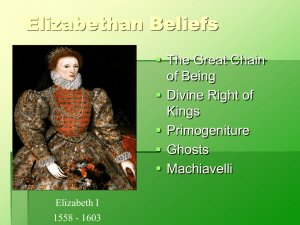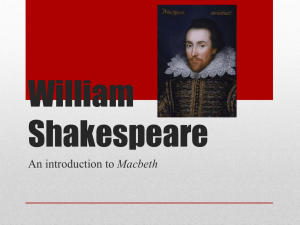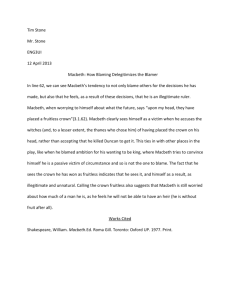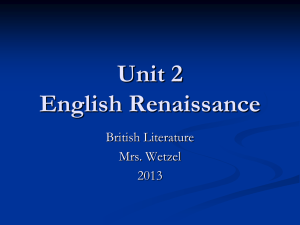Natural Order and Phenomena in Macbeth
advertisement
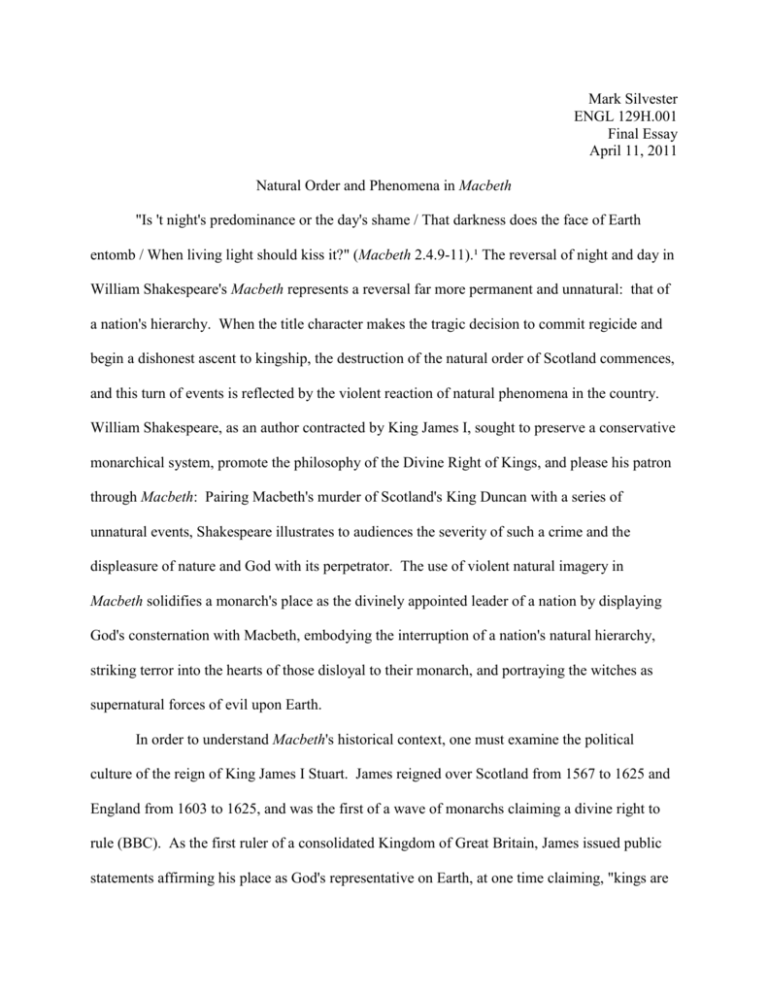
Mark Silvester ENGL 129H.001 Final Essay April 11, 2011 Natural Order and Phenomena in Macbeth "Is 't night's predominance or the day's shame / That darkness does the face of Earth entomb / When living light should kiss it?" (Macbeth 2.4.9-11).¹ The reversal of night and day in William Shakespeare's Macbeth represents a reversal far more permanent and unnatural: that of a nation's hierarchy. When the title character makes the tragic decision to commit regicide and begin a dishonest ascent to kingship, the destruction of the natural order of Scotland commences, and this turn of events is reflected by the violent reaction of natural phenomena in the country. William Shakespeare, as an author contracted by King James I, sought to preserve a conservative monarchical system, promote the philosophy of the Divine Right of Kings, and please his patron through Macbeth: Pairing Macbeth's murder of Scotland's King Duncan with a series of unnatural events, Shakespeare illustrates to audiences the severity of such a crime and the displeasure of nature and God with its perpetrator. The use of violent natural imagery in Macbeth solidifies a monarch's place as the divinely appointed leader of a nation by displaying God's consternation with Macbeth, embodying the interruption of a nation's natural hierarchy, striking terror into the hearts of those disloyal to their monarch, and portraying the witches as supernatural forces of evil upon Earth. In order to understand Macbeth's historical context, one must examine the political culture of the reign of King James I Stuart. James reigned over Scotland from 1567 to 1625 and England from 1603 to 1625, and was the first of a wave of monarchs claiming a divine right to rule (BBC). As the first ruler of a consolidated Kingdom of Great Britain, James issued public statements affirming his place as God's representative on Earth, at one time claiming, "kings are 2 not only God's lieutenants upon earth, and sit upon God's throne, but even by God himself they are called gods" (Kreis). Whether James' claims of divine right were made in an attempt to quell public dissent or justify his rule in his own mind, they were effective: As evidenced by the works of Shakespeare, the philosophy permeated the popular culture of James' time and influenced the work of the Bard of Avon. Seeking to please a patron that funded his career and held absolute power over institutions with the authority to censor theatre, Shakespeare had little choice but to uphold James' ideas in his work; whether the playwright held dear the philosophy of divine right is difficult to tell. The Bard's record of plays supportive to social conservatism and the monarchy indicate that, at least as a professional, Shakespeare sought to uphold traditional values and institutions through his works. Macbeth, written as a tribute to the Scottish King James I, exemplifies this practice and contains many socially conservative themes. Shakespeare seeks to preserve support of the monarchy and instill the philosophy of divine right in audiences of Macbeth by suggesting that, in the wake of events that disturb a divinely appointed monarchy, God would become displeased and express his anger through nature. After Macbeth's regicide of Duncan, storms descend upon Dunsinane, producing howling winds that sound like unearthly screams and disturb Macbeth's guests. Lennox describes the night, claiming, “The night has been unruly. Where we lay, / Our chimneys were blown down and, as they say, / Lamentings heard i' th' air” (3.4.28-30). As storms are a force of nature, and nature is a force of God, the unnatural behavior of weather in the aftermath of the murder depicts God’s displeasure with Macbeth’s disloyal act. Violent acts of nature abound throughout the work, and many of them embody what audiences perceive as God’s anger in the wake of a divine monarch’s murder. Macbeth also achieves its end of supporting social conservatism by comparing the 3 interruption of a nation's accepted hierarchy to the reversal of natural order. Prior to the murder of Duncan, Banquo and Fleance converse in Dunsinane, the former claiming, “There’s husbandry in heaven; / Their candles are all out” (2.1.4-5). The absence of starlight, which is replaced by a pitch-black night sky, is nature’s first method of foreshadowing the unnatural disruption of Scotland’s natural hierarchy. The day after the murder, a solar eclipse darkens the afternoon sky over the Scottish countryside, illustrating the complete reversal of nature in response to a deviously influenced revolution within Scotland’s government. Through this juxtaposition of natural disorder and hierarchical disruption, the author seeks to show audiences that a nation's hierarchy is as important as nature itself. Audiences later learn that Duncan’s royal horses, known for being well-trained and obedient, “Turned wild in nature, broke their stalls, flung out, / Contending 'gainst obedience” (2.4.17-18). This violent series of events, depicted by Ross, leads to the horses’ cannibalism and illustrates a complete disruption of their natural behaviors, reflecting Macbeth’s treachery and change of roles. Throughout Macbeth, examples of nature’s reversal as a response to Macbeth’s disruption of Scotland’s hierarchy display Shakespeare’s attempt to solidify monarchy as a divinely anointed institution and instill the philosophy of the divine right of kings in audiences. By instilling fear and doubt in the minds of those critical of England's monarch, James I, and the philosophy of divine right, Shakespeare aims to preserve conservatism and respect toward his nation's traditional institutions. As Macbeth is confronted with supernatural apparitions and diminishing sanity, his tragic story shows audiences what becomes of those who commit acts of treason against natural hierarchy. Shakespeare’s depiction of the witches as a supernatural force that promote the cause of evil upon Earth solidifies divine right philosophy by illustrating evil’s attempt to strike down 4 Scotland’s hierarchy. While God and his forces express displeasure with Macbeth’s treachery, the witches plant the seed of disloyalty in the Thane of Cawdor’s mind and support his evil actions throughout the play. From the very start of the play, the witches are depicted as foul and meddlesome creatures intent upon corrupting the title character and disrupting Scotland’s hierarchy. Laying the foundation for a reversal in natural order and establishing themselves as beings with supernatural powers, the witches croon, “Fair is foul, and foul is fair / Hover through the fog and filthy air” (1.1.12-13). Later in the work, the witches further display their magical powers by predicting events, including Macbeth’s ascension to Thane of Cawdor. The witches gain the Thane’s trust by correctly predicting his fortune; establishing themselves as reliable sources of information, they are easily able to plant the idea of regicide in Macbeth’s mind. Later in the play, when the witches show Macbeth a series of apparitions, they further illustrate their unnaturally evil powers and their ability to ensnare the new king in their plot to disturb Scotland’s government. A force of social conservatism and divine right philosophy, William Shakespeare’s Macbeth aims to convince audiences that a nation’s monarchical hierarchy is as divinely influenced as nature itself. By suggesting God’s displeasure with Macbeth’s disloyalty, juxtaposing the disruption of natural disorder with that of national hierarchy, embodying the consequences of treason in Macbeth, and portraying the witches as forces of evil upon the Earth, the play supports the philosophy of the divine right of monarchs. Since literature and political culture are often related, it is important to examine the politics of a work’s time of publication. Plays, novels, and pamphlets have long been influenced by the politics of their times, and are often meant to either support or undermine a philosophy. Shakespeare’s benefactor King James I Stuart was a staunch supporter of divine right philosophy, and the Bard of Avon was eager to 5 please his patron and support the king’s monarchy through Macbeth; as a result, the play contains strong undertones of social conservatism and makes for interesting analysis. Just as an eclipse darkens the sun, regicide creates a series of events that reverses the natural order of a divine right monarchy, and William Shakespeare effectively illustrates this idea through the use of natural imagery in Macbeth. 6 Works Cited "BBC - History - Historic Figures: James I and VI (1566 - 1625)." BBC History. BBC, 2011. Web. 08 Apr. 2011. <http://www.bbc.co.uk/history/historic_figures/james_i_vi.shtml>. Kreis, Steven. "James I, Speeches to Parliament (1609)." The History Guide. 12 May 2004. Web. 08 Apr. 2011. <http://www.historyguide.org/earlymod/james1609.html>. McDonald, Russ. The Bedford Companion to Shakespeare: an Introduction with Documents. Boston: Bedford/St. Martin's, 2001. Print. Shakespeare, William, and Sylan Barnet. Macbeth. New York: Signet Classics, 1998. Print.




